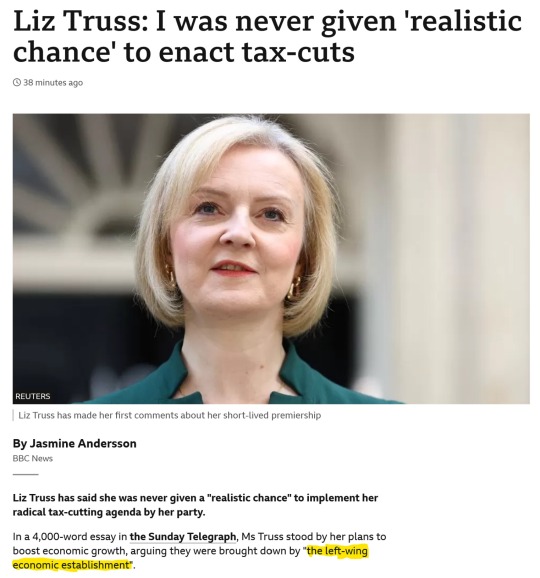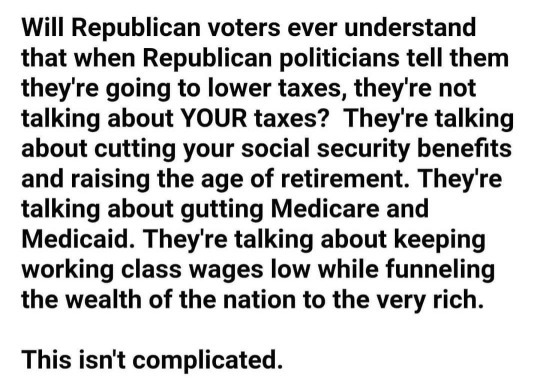#tax cuts
Text

313 notes
·
View notes
Link
It also fucks over single parents because of course.
132 notes
·
View notes
Text
Arizona is facing budget shortfalls for the rest of this fiscal year, as well as the new one that’ll start on July 1. That’s after starting last year with a roughly $2.5 billion surplus. Legislative budget analysts say revenues through November were $331 million lower than the estimate made for the current budget.
Gov. Katie Hobbs will present her budget proposal a week from Friday, and many lawmakers are no doubt already thinking about their priorities, as well.
The deficit is $400 million. The anticipated income tax revenues are running $250 million less than budgeted. The voucher program is running $350 million more. So you take a $2.5 billion surplus, you absorb those two things and you still have about $1.8 billion to spend.
20 notes
·
View notes
Text
People who want to cut funding to public* libraries: They're not profitable!
Broke: We're not supposed to be! We're a public service like firefighting, sidewalks, and public education. The government isn't a business!
Woke: Actually, extensive studies around the world show that libraries have incredible returns on investment. The smaller the community they serve, the bigger the ROI, with the biggest library system in the world having a return on investment of $7* and small towns having ROIs of $20+.
Bespoke: We're not supposed to be profitable, we're not a business, we're a government-run public service like firefighting, sidewalks, and public education. But if you want to measure profit, libraries have one of the best ROIs of all government services if not the best overall. Certainly better than tax cuts for the rich or warmongering.
=-=-=
* While this post is talking about monetary ROI, it's worth mentioning that studies also show that school libraries are also worth investing in, as they have found that the higher the funding the higher the academic achievements of the students.
** Translated from economic jargon, this means that for every dollar invested into a library the community makes $7 and $20+ dollars respectively.
Smaller communities have a bigger ROI because libraries provide services that would not be available to locals were it not for the library (e.g. help with setting up a small business, help filing taxes, courses to improve one's employability, free childcare through programming, at cost printing services, access to technology that would be too expensive for the regular public to afford, the opportunity to get materials for free that would otherwise cost money, etc).
#libraryland#librarylife#libraries#public libraries#school libraries#elementary school#conservatives#tax cuts#taxes#public services#government
270 notes
·
View notes
Text

The GOP Tax Policy Cycle!
Transcript and discussion of cartoon: https://www.patreon.com/posts/gop-tax-policy-89962240
There are hundreds more cartoons to read at Leftycartoons.com!
I can keep making these cartoons because of people supporting them at patreon.com/barry . A $1 or $2 pledge really helps!
#policartoon#political cartoon#political cartoons#political comics#tax policy#republicans#tax cuts#deficit#fuck the gop
18 notes
·
View notes
Text

#government shutdown#republicans#rethuglicans#mike johnson#deficit#GOP#tax cuts#income tax#Trump#wealthy#rich#corporations
16 notes
·
View notes
Photo

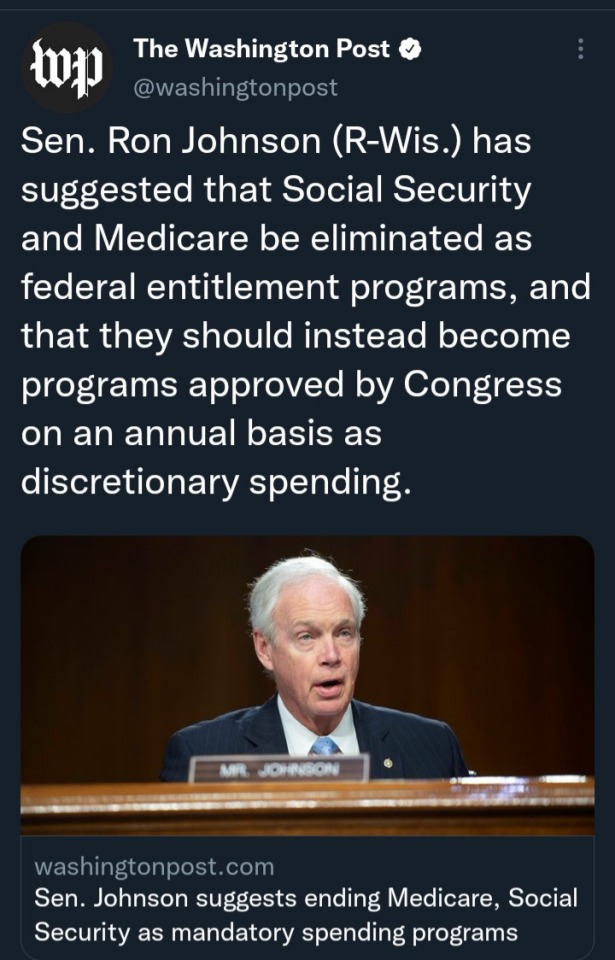

#Social Security#Medicare#tax#taxes#income tax#tax cuts#Ronald Reagan#Ron Johnson#entitlements#entitlement#benefits#benefit#earned benefits#Republican#Republicans#GOP#MAGA#GQP#spending#spend#budget
183 notes
·
View notes
Text
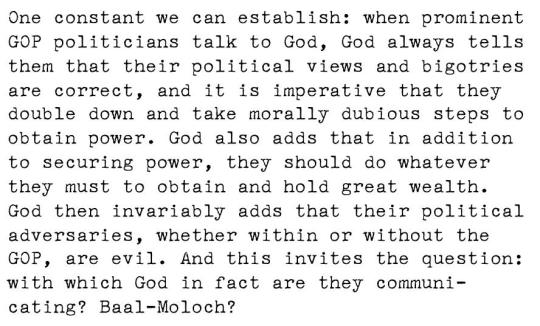
LETTERS FROM AN AMERICAN
April 13, 2024
HEATHER COX RICHARDSON
APR 14, 2024
There are really two major Republican political stories dominating the news these days. The more obvious of the two is the attempt by former president Donald Trump and his followers to destroy American democracy. The other story is older, the one that led to Trump but that stands at least a bit apart from him. It is the story of a national shift away from the supply-side ideology of Reagan Republicans toward an embrace of the idea that the government should hold the playing field among all Americans level.
While these two stories are related, they are not the same.
For forty years, between 1981, when Republican Ronald Reagan took office, and 2021, when Democrat Joe Biden did, the Republicans operated under the theory that the best way to run the country was for the government to stay out of the way of market forces. The idea was that if individuals could accumulate as much money as possible, they would invest more efficiently in the economy than they could if the government regulated business or levied taxes to invest in public infrastructure and public education. The growing economy would result in higher tax revenues, enabling Americans to have both low taxes and government services, and prosperity would spread to everyone.
But the system never worked as promised. Instead, during that 40-year period, Republicans passed massive tax cuts under Reagan, George W. Bush, and Trump, and slashed regulations. A new interpretation of antitrust laws articulated by Robert Bork in the 1980s permitted dramatic consolidation of corporations, while membership in labor unions declined. The result was that as much as $50 trillion moved upward from the bottom 90% of Americans to the top 1%.
To keep voters on board the program that was hollowing out the middle class, Republicans emphasized culture wars, hitting hard on racism and sexism by claiming that taxes were designed by Democrats to give undeserving minorities and women government handouts and promising their evangelical voters they would overturn the Supreme Court’s 1973 Roe v. Wade decision recognizing the constitutional right to abortion. Those looking for tax cuts and business deregulation depended on culture warriors and white evangelicals to provide the votes to keep them in power.
But the election of Democrat Barack Obama in 2008 proved that Republican arguments were no longer effective enough to elect Republican presidents. So in 2010, with the Citizens United v. Federal Elections Commission decision, the Supreme Court freed corporations to pour unlimited money into U.S. elections. That year, under Operation REDMAP, Republicans worked to dominate state legislatures so they could control redistricting under the 2010 census, yielding extreme partisan gerrymanders that gave Republicans disproportionate control. In 2013 the Supreme Court’s Shelby County v. Holder decision greenlighted the voter suppression Republicans had been working on since 1986.
Even so, by 2016 it was not at all clear that the cultural threats, gerrymandering, and voter suppression would be enough to elect a Republican president. People forget it now because of all that has come since, but in 2016, Trump offered not only the racism and sexism Republicans had served up for decades, but also a more moderate economic program than any other Republican running that year. He called for closing the loopholes that permitted wealthy Americans to evade taxes, cheaper and better healthcare than the Democrats had provided with the Affordable Care Act (also known as Obamacare), bringing manufacturing back to the U.S., and addressing the long backlog of necessary repairs to our roads and bridges through an infrastructure bill.
But once in office, Trump threw economic populism overboard and resurrected the Republican emphasis on tax cuts and deregulation. His signature law was the 2017 tax cuts for corporations and the wealthy at a cost of at least $1.9 trillion over ten years. At the same time, Trump continued to feed his base with racism and sexism, and after the Unite the Right rally at Charlottesville, Virginia, in August 2017, he increasingly turned to his white nationalist base to shore up his power. On January 6, 2021, he used that base to try to overturn the results of the 2020 presidential election.
Republican senators then declined to convict Trump of that attempt in his second impeachment trial, apparently hoping he would go away. Instead, their acquiescence in his behavior has enabled him to continue to push the Big Lie that he won the 2020 election. But to return to power, Trump has increasingly turned away from establishment Republicans and has instead turned the party over to its culture war and Christian nationalist foot soldiers. Now Trump has taken over the Republican National Committee itself, and his supporters threaten to turn the nation over to the culture warriors who care far more about their ideology than they do about tax cuts or deregulation.
The extremism of Trump’s base is hugely unpopular among general voters. Most significantly, Trump catered to his white evangelical base by appointing Supreme Court justices who would overturn Roe v. Wade, and in 2022, when the court did so, the dog caught the car. Americans overwhelmingly support reproductive freedoms, and Republicans are getting hammered over the extreme abortion bans now operative in Republican-dominated states. Now Trump and a number of Republicans have tried to back away from their antiabortion positions, infuriating antiabortion activists.
It is hard to see how the Republican Party can appeal to both Trump’s base and general voters at the same time.
That split dramatically weakens Trump politically while he is in an increasingly precarious position personally. He will, of course, go on trial on Monday, April 15, for alleged crimes committed as he interfered in the 2016 election. At the same time, the $175 million appeals bond he posted to cover the judgment in his business fraud trial has been questioned and must be justified by April 14. The court has scheduled a hearing on the bond for April 22. And his performance at rallies and private events has been unstable.
He seems a shaky reed on which to hang a political party, especially as his MAGA Republicans have proven unable to manage the House of Representatives and are increasingly being called out as Russian puppets for their attacks on Ukraine aid.
Regardless of Trump’s future, though, the Reagan Era is over.
President Biden and Vice President Kamala Harris have quite deliberately rejected the economic ideology that concentrated wealth among the 1%. On their watch, the federal government has worked to put money into the hands of ordinary Americans rather than the very wealthy. With Democrats and on occasion a few Republicans, they have passed legislation to support families, dedicate resources to making sure people with student debt are receiving the correct terms of their loans (thus relieving significant numbers of Americans), and invested in manufacturing, infrastructure, and addressing climate change. They have also supported unions and returned to an older definition of antitrust law, suing Microsoft, Amazon, and Apple and allowing the federal government to negotiate with pharmaceutical companies over drug prices.
Their system has worked. Under Biden and Harris the U.S. has had unemployment rates under 4% for 26 months, the longest streak since the 1960s. Wages for the bottom 80% of Americans have risen faster than inflation, chipping away at the huge disparity between the rich and the poor that the policies of the past 40 years have produced.
Today, in an interview with Jamie Kitman of The Guardian, United Auto Workers president Shawn Fain, who negotiated landmark new union contracts with the country’s Big Three automakers, explained that the world has changed: “Workers have realized they’ve been getting screwed for decades, and they’re fed up.”
LETTERS FROM AN AMERICAN
HEATHER COX RICHARDSON
#GOP#Letters From An American#Heather Cox Richardson#UAW#the economy#history#income inequality#culture wars#trickle down#supply side#deregulation#white nationalism#tax cuts
6 notes
·
View notes
Text
Listening to an podcast last year and one of the hosts said in 200 years people will have no idea what the media of our time was like because it will all be locked behind copyright walls. And now we're in a place where companies are straight up just deleting movies and shows that don't immediately turn a profit, keeping people from seeing them ever again.

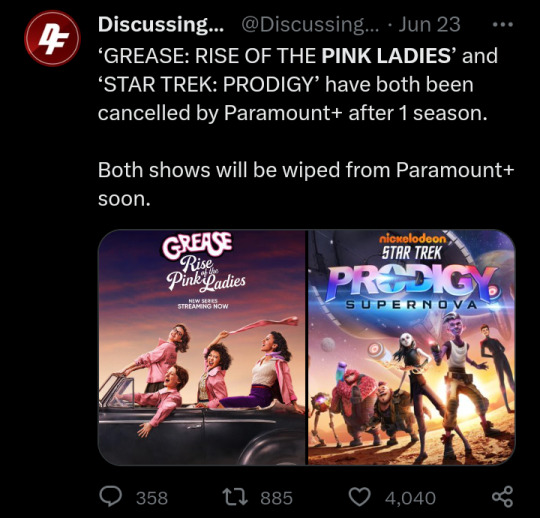
#75% of all silent films were lost but we're now destroying media voluntarily#there's now no ethical justification not to be a pirate#movies#series#paramount+#disney+#crater#mckenna grace#kid cudi#rise of the pink ladies#grease rotpl#copyright#tax cuts
21 notes
·
View notes
Text

12 notes
·
View notes
Text
"Science reconfirms what we've all known" is a common headline, but rare in politics.
So, anyone complaining about tax hikes is a rube at this point.
60 notes
·
View notes
Text

93 notes
·
View notes
Photo
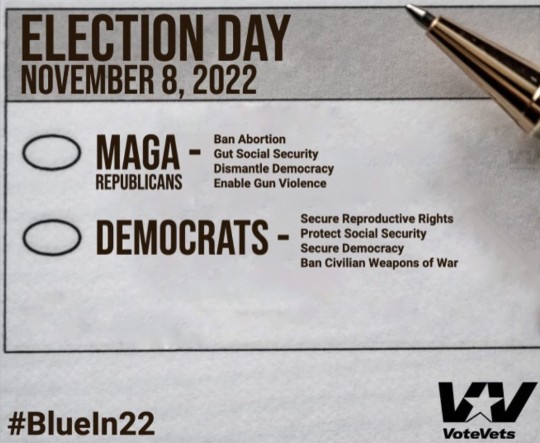

#Vote Blue#Vote Blue in 22#abortion#choice#pro-choice#freedom#Social Security#Medicare#Medicaid#tax#taxes#tax cuts#education#educate#health care#Democracy
67 notes
·
View notes
Link
Instead, a total of 3,452 jobs with oil sands majors were lost to automation and consolidation since 2019, concludes the report from the University of Alberta’s Parkland Institute. “Meanwhile, those same companies added millions of dollars to the compensation of their CEOs and rewarded their shareholders with generous dividends,” the institute says.
Alberta Premier Jason Kenney’s United Conservative Party (UCP) government said 55,000 new jobs would be created, offsetting a projected $2.4-billion loss in revenue, from its plan to cut the corporate tax rate from 12% in 2019 to 8% by 2022. But three years later, and with the 8% tax cut delivered two years ahead of schedule via Alberta’s Recovery Plan, Parkland says that the boon to the corporate sector enriched the coffers of the oil sands “Big Four,” even as provincial revenues tanked by twice the projected amount. And 3,452 oil sands workers have been given pink slips.
56 notes
·
View notes
